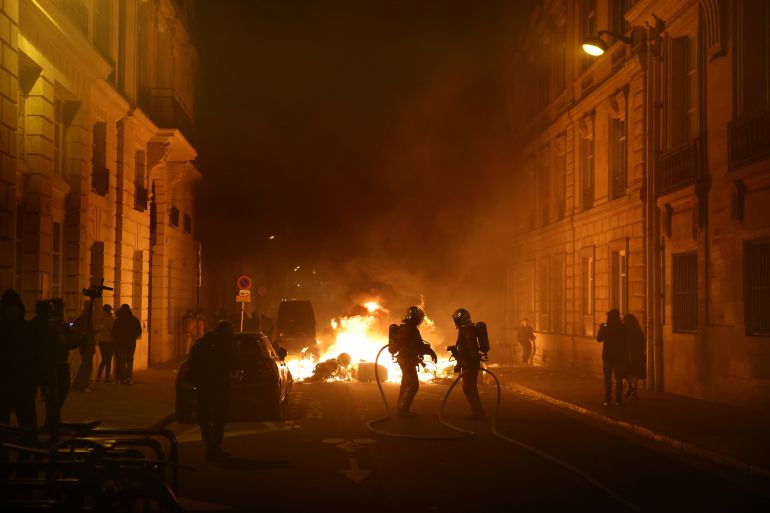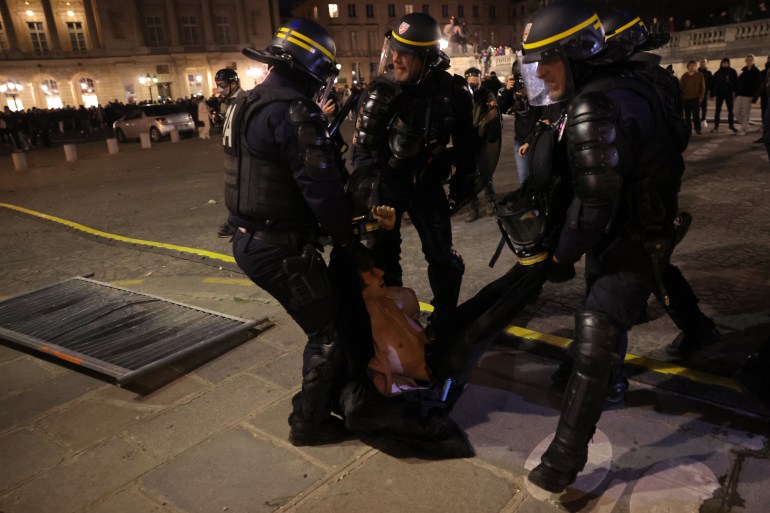French police use batons, tear gas in Paris amid pension protests
Protests rage after the French leader bypassed opposition and used a special constitutional power to raise the retirement age.

French riot police used batons, tear gas and water cannons to clear demonstrators from a central Paris square where a crowd of thousands had gathered to protest President Emmanuel Macron’s pensions reform.
Lines of police, with riot shields and batons drawn, advanced towards the Place de la Concorde late on Thursday evening, while others fired water cannons after a fire was lit in the middle of the historic square.
Keep reading
list of 2 itemsIs France’s work-life balance under threat?
Police baton-charged and used tear gas to push the protesters back across the square and away from a bridge leading to the Palais Bourbon – the meeting place of the National Assembly, France’s lower house of parliament – the Agence-France Presse news agency reported.
France‘s Interior Minister Gerald Darmanin instructed police to put in place “enhanced protective measures” for members of parliament in the face of the ongoing protests that erupted as Macron shunned the French Parliament and opted to push through a highly unpopular pension reform bill that would raise the retirement age from 62 to 64.
AFP said police reported making eight arrests while the broadcaster France Info cited police sources as saying that 217 people were arrested due to unrest, including at Place de la Concorde where an estimated 6,000 demonstrators set fire to wooden pallets and threw objects at police officers.
Protests also broke out in other French cities including Marseille, Dijon, Nantes, Rennes, Rouen, Grenoble, Toulouse and Nice.

Earlier on Thursday, Macron’s administration used a special constitutional power to push the bill through amid calls for a no-confidence motion from the opposition.
When Prime Minister Elisabeth Borne triggered the special procedure to push the bill through the National Assembly without a vote, shouts and chants erupted from left-wing legislators.
The move, using Article 49.3 of the French Constitution, ensured the bill was adopted, but it also showed that Macron and his government had failed to garner enough of a majority in parliament.
The country’s far-right opposition has said it will file a motion of no-confidence in the government.
The decision is a “total failure” for Macron and Borne “cannot stay” in her post, said Marine Le Pen, the far-right candidate in the last two presidential elections who now leads National Rally (RN) deputies in parliament.
The French leader wants to raise the retirement age so workers put more money into the system, which the government says is on course to run a deficit. The bill is the flagship legislation of Macron’s second term. His plan to raise the pension age has prompted large strikes and protests across the country since January.
‘Failure of politics’
“Forcing through a bill by decree is something that’s done rarely and it is seen as something of a failure of politics in many respects,” said Al Jazeera’s Natacha Butler, reporting from outside the French Parliament.
Butler said protesters and trade unions have said no matter what happens, they would continue to rally against the bill.
“Opinion polls suggest anywhere between two-thirds to three-quarters of the French public are against a bill that they see as unfair and that they say is eroding their rights,” said Butler.
French unions now plan another day of strikes and protests against the pension reform.
“The united union front continues to demand the withdrawal of the reform and calls for another day of strikes and demonstrations on Thursday, March 23,” CGT union official Catherine Perret told a news conference.
Earlier, Borne, the prime minister, was greeted by boos as she arrived at the National Assembly to announce the special procedure.
The session was suspended for two minutes after left-wing legislators singing the national anthem prevented Borne from speaking.
When the session resumed, Borne took the floor. But her speech was largely drowned out by boos and chants from opposition members of parliament and shouts of “resignation” in a rare chaotic scene in the French Parliament.
The atmosphere was tense outside parliament as heavily armed guards and riot police ringed the neighbourhoods around the Palais Bourbon.
The Senate adopted the bill in a 193-114 vote, a tally that was largely expected since the conservative majority of the upper house favours raising the retirement age.
Macron’s alliance lost its parliamentary majority last year, forcing the government to count on conservative legislators to pass the bill.
Leftists and far-right legislators are strongly opposed and conservatives are divided, which made the outcome unpredictable.